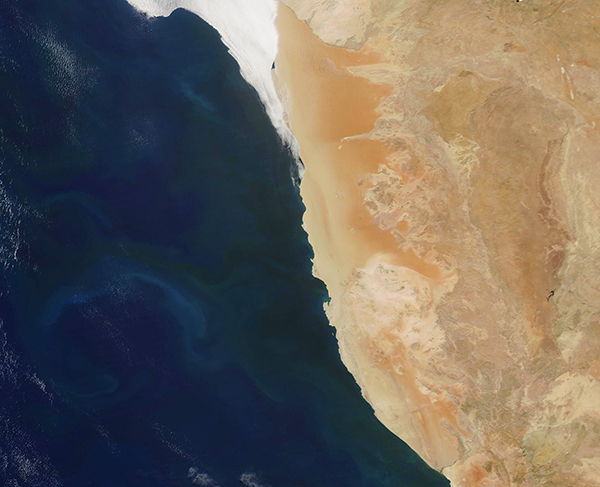Images
November 15, 2022 - Bloom off Namib Desert
Tweet
Streaks and swirls of glowing jewel-like tones colored the waters of the South Atlantic Ocean, creating a sharp contrast to the soft orange sands of the Namib Desert in mid-November 2022. The Moderate Resolution Imaging Spectroradiometer (MODIS) on board NASA’s Aqua satellite acquired this true-color image on November 14.
The bright colors stretch across the ocean for hundreds of kilometers, each marking a bloom of microscopic plant-like organisms known as phytoplankton. Such blooms are common in the coastal waters off southwest Africa where cold, nutrient-rich currents sweep north from Antarctica and interact with the coastal shelf. At the same time, the easterly trade winds push surface water away from the shore, allowing water from the ocean’s floor to rise to the surface, bringing with it iron and other material. Both the currents and upwelling water creates a nutrient-rich environment where these tiny surface-dwelling ocean plants thrive.
At the top of the image, a broad bank of fog creeps over the coast of the northern Namib Desert. The extremely arid Namib is the only coastal desert in the world to contain large dune fields influenced by fog. Although rain rarely falls across the desert, the humidity and moisture of fog encourages the growth of diverse vegetation, especially on the rocky hills or mountains that rise above the desert.
Image Facts
Satellite:
Aqua
Date Acquired: 11/14/2022
Resolutions:
1km (328 KB), 500m (833.2 KB), 250m (1.8 MB)
Bands Used: 1,4,3
Image Credit:
MODIS Land Rapid Response Team, NASA GSFC
Tweet
Streaks and swirls of glowing jewel-like tones colored the waters of the South Atlantic Ocean, creating a sharp contrast to the soft orange sands of the Namib Desert in mid-November 2022. The Moderate Resolution Imaging Spectroradiometer (MODIS) on board NASA’s Aqua satellite acquired this true-color image on November 14.
The bright colors stretch across the ocean for hundreds of kilometers, each marking a bloom of microscopic plant-like organisms known as phytoplankton. Such blooms are common in the coastal waters off southwest Africa where cold, nutrient-rich currents sweep north from Antarctica and interact with the coastal shelf. At the same time, the easterly trade winds push surface water away from the shore, allowing water from the ocean’s floor to rise to the surface, bringing with it iron and other material. Both the currents and upwelling water creates a nutrient-rich environment where these tiny surface-dwelling ocean plants thrive.
At the top of the image, a broad bank of fog creeps over the coast of the northern Namib Desert. The extremely arid Namib is the only coastal desert in the world to contain large dune fields influenced by fog. Although rain rarely falls across the desert, the humidity and moisture of fog encourages the growth of diverse vegetation, especially on the rocky hills or mountains that rise above the desert.
Image Facts
Satellite:
Aqua
Date Acquired: 11/14/2022
Resolutions:
1km (328 KB), 500m (833.2 KB), 250m (1.8 MB)
Bands Used: 1,4,3
Image Credit:
MODIS Land Rapid Response Team, NASA GSFC




